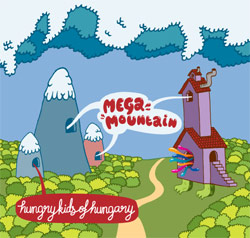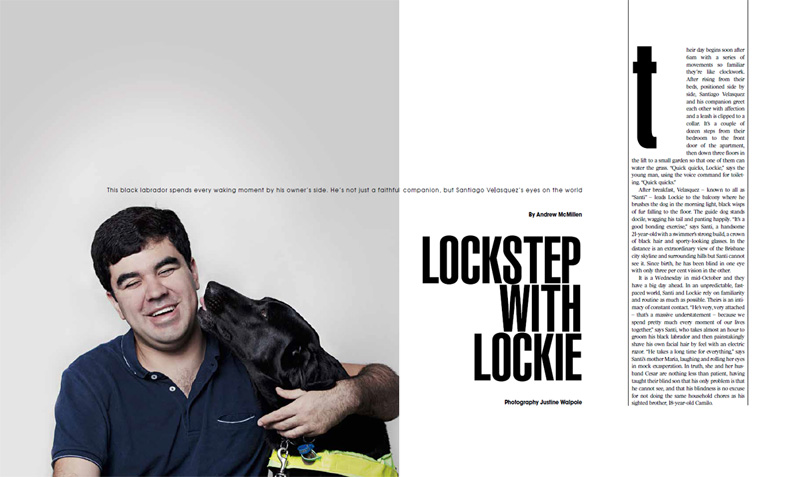I received my first rewrite request last week.
I’ve been writing for Rave Magazine, a Brisbane street press, since June 2007. I wrote for FasterLouder, an Australian music site, from the same time until February 2009. I started with Mess+Noise in April 2009.
The rewrite request was from the Mess+Noise Editor, Darren Levin, who wasn’t happy with the copy I’d submitted for a review of Brisbane band Hungry Kids Of Hungary‘s EP, Mega Mountain.
My original submission:
 Hungry Kids Of Hungary – Mega Mountain
Hungry Kids Of Hungary – Mega Mountain
4 track, EP (2009, Independent)
The Beach Boys. The Beatles. Now that we’ve got those two very obvious influences on Hungry Kids Of Hungary’s sound out of the way, let’s discuss their music. The Brisbane locals exhibit indie pop that’s just as bright and colourful as their cover artwork. The four members make no apologies for their pursuits of strong vocal melodies in the style of past greats, and nor should they: this is an engaging second release from a promising act.
Disc opener Two Stones is a well-paced, keyboard-led track that features vocal input from all members. These combined vocal harmonies – used repeatedly, yet sparingly throughout these four songs – are one of the act’s strongest assets. Two Stones dissolves into a vocal melody that’s mirrored by a guitar, until the band’s post-song applause and hoots are punctuated by the sound of drumsticks counting in the next track. Goddamn, I love it when bands do that. It’s an effective tool to create a sense of coherence, and Hungry Kids do it well.
Second track and lead single Scattered Diamonds is a disarmingly brilliant pop song. Its bass, floor-tom and clean guitar introduction set the tone for an exceptionally catchy romp through the band’s narrated weekend. Enchanting harmonies and a xylophone appear a minute into the track, by which time you’re already nodding your head and humming the melody. That they can pull off a bass-led, bottle-clinking interlude and maintain the listener’s interest argues a strong case for their adept songwriting skills. “You want it? You got it all,” the band repeatedly suggest. It’s this sense of humility and lack of pretension that endears the listener to their cause.
The disc’s latter half is subdued: Old Money is another keyboard-heavy tune that positively drags when compared to the wholly engaging pop of the previous two tunes. The Kids close with Good Times, which picks up speed across four minutes before climaxing amid cymbals and ‘whoa-oh-oh’s. All that’s left wanting with this release is an increased coherence between these two tracks and the opening duo, whose sheer likability trumps any doubts regarding the quartet’s pop proficiency.
Darren replied:
Hey Andrew,
I think you might need to have another crack at this one mate. It’s a bit too streetpress/FasterLouder for our readership.
First, the review’s far too basic; a song by song description of the album with no flair or critical edge. Have a look at some of the reviews on our site to see what we’re after.
If you need any pointers, let me know.
Cheers,
d.
I was taken aback. What? Something that I submitted isn’t good enough for publication?
This is what two years of writing for street press and FasterLouder had done to my ego. Due to the comparably lower standards of those publications – the week churn and demand of street press, and FasterLouder’s seemingly laissez-faire attitude to content – I’d come to believe that everything I submitted was fit for publication, just because I had taken the time to sit down and write it.
Or more importantly, during those two years, I’d received little other than either silence or praise. I took the former to mean the latter.
I’m not proud to admit that I reacted irrationally to Darren’s rewrite request. While I do my best to remain calm and in control at all times, I probably swore and frowned at the screen. I didn’t reply to him for several days, even while knowing that as a freelance writer, silence toward an editor will rarely achieve a desired outcome.
My desired outcome was to continue believing that everything I write is golden, and that my editor was wrong, rather than to start afresh and rewrite a review of a disc that I liked, but probably wouldn’t listen to very often.
Ridiculous.
After a couple hours stewing on my rejection – sob – I emailed Andrew Ramadge, a fellow Mess+Noise (and Sydney Morning Herald, and The Brag) writer whose work I greatly admire.
Hullo Mr Ramadge,
I’ve run into a mite of trouble with an EP review I submitted last week.
Now, I am a bit lost here. Sure, my review was mostly positive, but that’s because I really liked it. Especially the first two tracks. In terms of artistic vision, Hungry Kids are remarkably accomplished for a band so young.
So is my rewrite a matter of introducing the (few) negative aspects first, before admitting that it is really quite good? This seems like a rather backwards, dishonest way to write. Counter-intuitive.
Your help appreciated,
Andrew
He responded with:
Hi Andrew,
It’s not a bad review. As Darren says, the problem is more the style. That’s a review I would expect to read in street press, not really Mess+Noise.
In a nutshell, it’s because it reads like it was written by a musician.
These are the musician words, in order: “keyboard, vocal harmonies, vocal melody, guitar, applause, drumsticks, bass, floor-tom, clean guitar, harmonies, xylophone, bass-led, keyboard-heavy, cymbals”.
Some of those are necessary, of course — I’m not suggesting you never say “keyboard” in a review!! — but in general it sounds like you are describing the songs by relying too heavily on just describing the instruments used.
So, as a reader, I get a hint of what it sounds like, but the question you don’t answer is: what does it feel like?
Why does it sound like The Beach Boys? Is it because it has themes of young love or sunshine or US nostalgia? Or is it simply the instruments and melodies used? If it is just the latter, and not the themes / feelings, then what other themes of their own are Hungry Kids Of Hungary exploring? Same question for The Beatles.
If you find yourself stuck writing about that — and you might be, not every album makes you picture something or feel something — then perhaps tell us a bit more about who Hungry Kids are or how they formed or how they fit into the Brisbane musical landscape instead. Give us a bit of context.
Also there are a few cliche no-nos in there: “well-paced”, “promising act”, “disarmingly brilliant”, “exceptionally catchy”, “enchanting harmonies”.
You’ll notice most of those have the same two-word format. I’m sure there’s some technical term for it but I don’t know it. :P
As an exercise, try doing one of two things when you catch yourself using those double-ups. Either use one word only — “brilliant” instead of “disarmingly brilliant” — and use them sparingly, so that the one word means quite a lot. Sort of a minimalist approach.
The other option is just to expand on the idea. If the harmonies are “enchanting”, and it’s worth saying so, then tell me exactly why. What is it about them that is enchanting? What sort of desire does it provoke in you?
Hope that helps.
If you’re a little bruised, it will pass — from experience, I can say that there is nothing better than an editor that pushes you to do better, even though it’s a pain in the arse at the time.
Cheers,
Andy
That’s some awesome advice. My ego = humbled.
Andrew made me realise that I still write like a flaming imbecile fairly regularly. The regularlity’s decreasing, I think. And as much as be called out for writing like an idiot hurts at the time, it’s definitely for the better.
Days later, I listened to the disc with fresh ears – and, perhaps most importantly, without distraction – and realised that I’d barely registered the lyrics while writing my review. So I focussed on that aspect, because there’s little else to fault musically.
Here’s what I came up with.
 Hungry Kids Of Hungary – Mega Mountain
Hungry Kids Of Hungary – Mega Mountain
4 track, EP (2009, Independent)
Is it too much to ask for meaningful lyrics in pop music? Perhaps it’s folly to compare the lyrical output of Brisbane’s Hungry Kids Of Hungary to the oversexed, plastic tripe that features throughout the ARIA charts. But how many years of writing and performance did it take for pop visionaries The Beatles to overcome their fixation on girls, love and days of the week, or The Beach Boys to write songs about something more than surfing? Although musically proficient, the lyrics of the four songs on this EP dissolve under a critical microscope.
Non-sequiturs and a dead-end narrative haunt ‘Old Money’ which, “Goes a long way/But not long enough to shake that frown.” I can’t tell if they’re singing about worldwide decline in newspaper sales, but it seems plausible: “Still the readers of these publications buy/But now Daddy’s overseeing/So maybe this time.” As awkward as these words appear out of context, their enthusiastic in-song delivery matches Hungry Kids’ uncomplicated keyboard-driven pop perfectly.
This is an easily enjoyable release from the Brisbane quartet, who first came to attention with their self-titled 2008 EP. Producer Matt Redlich captures an undoubtedly relaxed studio environment: the band cheer between takes, clink bottles mid-song (see the bass interlude of single ‘Scattered Diamonds’) and lean into the microphone for those sweet Beach Boys harmonies. Still, I can’t shake the feeling that the majority of the band’s attention was spent on composition and harmony, instead of the words between.
Darren’s feedback:
mate, it’s much better! it actually tells the reader something; it’s not just a track by track summation, but an analysis of why the album is good/isn’t good.
almost like a different person wrote it — i like this andrew more ;)
d.
This exchange and rewrite exercise taught me more about music writing than nearly two years writing elsewhere. And I’m not suggesting that my other editors’ lack of critical feedback is a failure on their part.
But consider the force with which Darren’s request hit me. The couple of lines that he typed were the biggest reality check I’ve had as a writer so far. And I can’t thank him enough for that.

 Hungry Kids Of Hungary – Mega Mountain
Hungry Kids Of Hungary – Mega Mountain